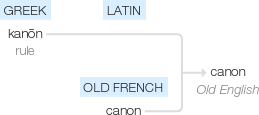Canon
Old English: from Latin, from Greek kanōn ‘rule’, reinforced in Middle English by Old French canon .
wiktionary
From Middle English canoun, from Old French canon, from Latin canōn, from Ancient Greek κανών(kanṓn, “measuring rod, standard”), akin to κάννα(kánna, “reed”), from Semitic (compare Hebrew קָנֶה (qane, “reed”) and Arabic قَنَاة (qanāh, “reed”)). Doublet of qanun. See also cane.
From Middle English canoun, ultimately from Latin canonicus (either by shortening or back-formation from Old English canonic, or via Old Northern French canoine).
canon (plural canons)
etymonline
canon (n.1)
"a rule or law," Old English canon "rule, law, or decree of the Church," from Old French canon or directly from Late Latin canon "Church law, a rule or doctrine enacted by ecclesiastical authority," in classical Latin, "measuring line, rule," from Greek kanon "any straight rod or bar; rule; standard of excellence," perhaps from kanna "reed" (see cane (n.)).
The Latin word was taken in ecclesiastical use for "decree of the Church." General sense of "a rule or principle" is from late 14c.; that of "standard of judging" is from c. 1600. From c. 1400 as "the Scriptures, the books of the Bible accepted by the Christian church," also extended to secular books of admitted excellence or supremacy. Meaning "catalogue of acknowledged saints" is from 1727. Musical sense "a kind of fugal composition" is from 1590s. Related: Canonicity.
The secular canon, with the word meaning a catalog of approved authors, does not actually begin until the middle of the eighteenth century .... [Harold Bloom, "The Western Canon," 1994].
canon (n.2)
"clergyman living according to rules," c. 1200 (late 12c. as a surname), from Anglo-French canun, from Old North French canonie (Modern French chanoine), from Church Latin canonicus "clergyman living under a rule," noun use of Latin adjective canonicus "according to rule" (in ecclesiastical use, "pertaining to the rules or institutes of the church canonical"), from Greek kanonikos, from kanon "rule" (see canon (n.1)).
